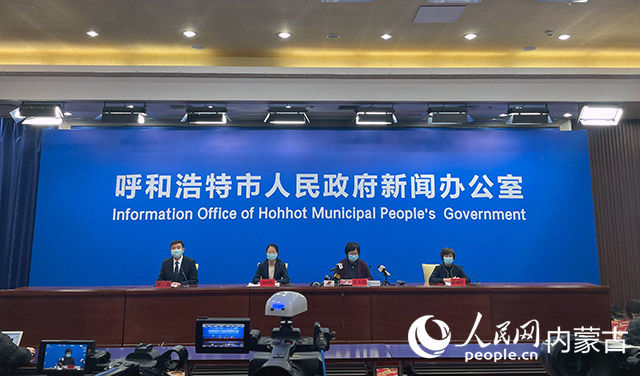This article is reprinted from: People’s Daily Online

The press conference. Photo by Kou Yanan, People’s Daily Online
People’s Daily Online, Hohhot, March 3 (Kou Yanan) On March 3, Hohhot held the 17th press conference on the prevention and control of the new crown pneumonia epidemic. At the press conference, Inner Mongolia Chen Lixia, an expert from the Mental Health Center of the Autonomous Region, answered questions about the psychological counseling work carried out by key groups in Hohhot in the face of the severe epidemic situation and long-term isolation, and individual people may feel panic and anxiety.
According to Chen Lixia, since the outbreak of the current round of the epidemic in Hohhot on February 15, the medical prevention and control team of the Autonomous Region Epidemic Prevention and Control Headquarters has simultaneously arranged and deployed epidemic prevention and control and psychological intervention. The Inner Mongolia Autonomous Region Mental Health Center recruited 97 people, including psychiatrists, psychotherapists, and psychiatric nurses. Beginning on February 23, we have assisted Hohhot City to carry out psychological intervention to ensure the physical and mental health of the people in the capital and maintain social harmony and stability. In the work, for different objects, targeted psychological intervention was carried out.
Chen Lixia said: “For confirmed patients, front-line medical staff and disease control personnel. We sent 15 medical staff to the Fourth Hospital of Inner Mongolia to provide diagnosis, treatment and care for patients with mental disorders, and at the same time undertake the responsibility of all patients and medical staff in the hospital. Psychological intervention work for personnel.”
According to reports, for quarantined people, such as close contacts and fever patients, the autonomous region has transferred a total of 82 mental and psychological backbones from 12 alliance cities in the region, and these backbones have participated in The personnel who work in the psychological intervention of the epidemic are more experienced.
“We communicated with the head of the hotel to find out the number of people under quarantine, and filled out the mental health questionnaire on a voluntary basis. At the same time, combined with the report of the head of the hotel, we screened key groups of people, and classified and implemented policies according to the different situations of the people. General interventions and key interventions are given respectively. For example, some emotional problems such as insomnia and anxiety appear temporarily because of their lack of understanding of the epidemic isolation policy. We give general interventions. By popularizing disease knowledge and publicizing policies, dispel their concerns and ease their anxiety Emotions, it is recommended to call the 12320-5 psychological assistance hotline when necessary. If the mood fluctuates greatly, affecting its normal life and function, or has a history of mental and psychological diseases, obvious symptoms, and even the possibility of danger, please consult the experts in the guidance group and give Focus on intervention, and even drug treatment.” Chen Lixia said.

The Third Hospital of Inner Mongolia Autonomous Region Psychological Assistance Hotline Poster
For sub-close contacts, volunteers, and susceptible persons, etc. The autonomous region has opened the autonomous region psychological assistance hotline 12320-5, and a professional team provides 7*24-hour psychological assistance services.
In addition, the autonomous region has produced targeted popular science materials for different groups of people with different characteristics, such as the elderly, children and adolescents, mentally ill patients, etc., as well as different problems encountered by medical workers during the epidemic. Class personnel solve confusion and relieve stress.
Chen Lixia said that there are some special groups among them, that is, patients with severe mental disorders at home. These people are usually followed up and managed by community grassroots personnel. Considering the heavy task of grassroots personnel participating in the epidemic prevention and control work, we now undertake the follow-up work, timely and dynamically understand the number of registered patients in the city’s management and control communities, follow up by telephone one by one, and grasp the patients. the current situation, and solve different problems. Up to now, 403 home-based patients with severe mental disorders who have been registered in the control community (village) have been followed up and dealt with in a timely manner according to the docking situation and illness.
The next step will be to adjust the work plan at any time according to the changes in the epidemic situation in Hohhot, and strive to achieve “zero infection of stationed personnel and zero occurrence of psychological accidents”.
During the epidemic, in order to let the general public relax at home, the Hohhot City Library has opened online and offline reading services to provide spiritual food for the general public readers to fight the epidemic at home.